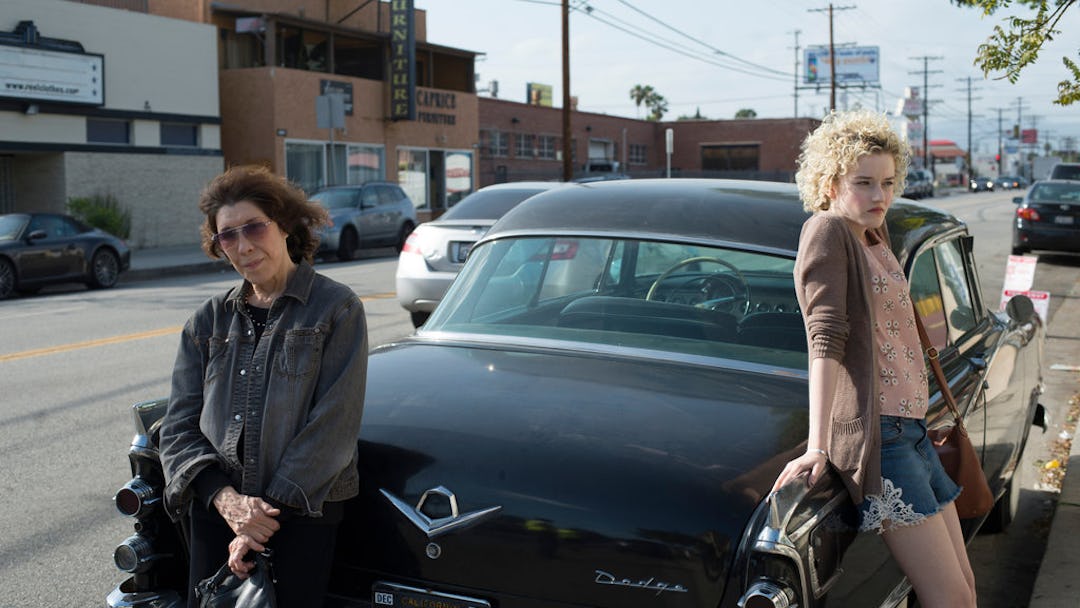Writer-director Paul Weitz and star Lily Tomlin have been promoting Grandma on the festival circuit for over half a year. But with the film’s release by Sony Pictures Classics less than a week away, Weitz and Tomlin gave the general public a preview of the project Monday night at New York’s Film Society of Lincoln Center by discussing Grandma, its breakneck 19-day shoot, and Tomlin’s five-decade career in comedy.
Grandma‘s already attracted plenty of positive press thanks to its twofold hook: not only does the film dare to use abortion as a source of comedy in the vein of Obvious Child; it also gives Tomlin the rich, wickedly funny role she deserves in title character Elle Reid, a lesbian poet mourning the loss of her longtime partner. “I did this as an excuse for spending time with Lily,” Weitz semi-jokes, and it shows. Elle’s the kind of obstinate flake who makes her credit cards into a wind chime rather than remain part of The System, so when her granddaughter Sage turns to her for help, the two embark on a day trip through Elle’s friendships, flaws, and convictions.
Weitz wrote the part with Tomlin in mind after working with her on 2013’s Admission, in which she played Tina Fey’s mother. Both Weitz and Tomlin have primarily worked on studio comedies before — he directed American Pie and About a Boy with his brother, Chris, while any good misandrist knows Tomlin in part from 9 to 5 — and both spoke favorably of the change of scale afforded by an indie. Grandma was shot quickly, in less than three weeks, with Tomlin wearing next to no makeup and driving her actual car, a ’55 sedan. “It takes a lot to look well in a studio movie!” Tomlin said, but Weitz “photographed us so we looked like people.” After all, “We have a certain dignity we have to preserve.” (As is typical of Tomlin appearances, that was one of many laugh lines.)
Interestingly, Tomlin told the audience that custom projects like Weitz’s don’t come her way very often. When the moderator speculated that she must get approached with scripts all the time, her response was immediate: “No, I don’t. I’m of an age where I might get an offer to do a supporting role or something, and even then it might not be a bona fide offer.” She and Grace and Frankie co-star Jane Fonda joke that it often costs them money to take cameo roles once they factor in expenses like bringing in their own makeup artists — she wasn’t joking about what it takes to look studio-ready.
Then again, Tomlin says, “I don’t consider myself a movie star.” After all, she performed a two-hour, one-woman show in the San Fernando Valley the night after Grandma wrapped at 3 AM, and during the audience Q&A, she recalled her beginnings as a character-based sketch comedian, later the basis of her television big break on Rowan & Martin’s Laugh-In. Tomlin’s first performances were sketches mocking her neighbors — “I would perform by myself, [since] I was much more reliable,” she joked; “I think I was the world’s first performance artist” — and an irritating college classmate inspired one of her most iconic characters, Suzie Sorority.
Returning to Grandma, Tomlin described Elle as “a very organic role for me to do,” particularly compared to her characters in studio comedies. She praised the work of costar Julia Garner (“I didn’t feel I had anything to teach her as an actor because she is so natural, so unaffected”), whose performance Weitz described as the crux of the film: “The movie is essentially about a young woman who doesn’t know how to stand up for herself… and who doesn’t know how to tell people to shove it when they need it.” Hence Elle, who has neither of those problems.
Later, the discussion turned from Grandma to the state of female-centric film at large. When an audience member asked what those outside the industry could do to make sure more films about women, as Grandma unabashedly is, get made, Tomlin responded jokingly — and not a little bit nihilistically: “You’re just gonna have to raise children in some way that they view women in a more egalitarian way. It may take a few generations.” There’s also the fact that even Grandma isn’t made by women, for women: “It’s taken a man to make a film with so many strong female roles, but Paul’s such a special person — guy — man.”
Weitz was more practical, suggesting a two-pronged approach: money and transparency. The runaway financial success of The Hunger Games will almost definitely lead to more women at the helm of blockbusters, while awareness of Hollywood pay gaps might be “the only good thing” to come out of this year’s Sony leaks. Which brought Weitz right back around to Grandma and one of its central themes: the gap between Sage’s teenage reserve and Elle’s fierce outspokenness, manifested in everything from her willingness to tell off pretty much anyone to her outrage on Sage’s behalf. (Sage just accepts she’ll have to pay 600 bucks for an abortion; Elle can remember the days of free women’s health clinics.)
“Until recently, there’s been an erasure of consciousness,” Weitz said, that he attributes to “a sense of false victory.” Part of what Grandma aspires to be is an antidote to this erasure — and in 2015, a year when pop-star feminism has hit its peak and major websites announce themselves with documentaries about abortion access, it couldn’t be better timed.
